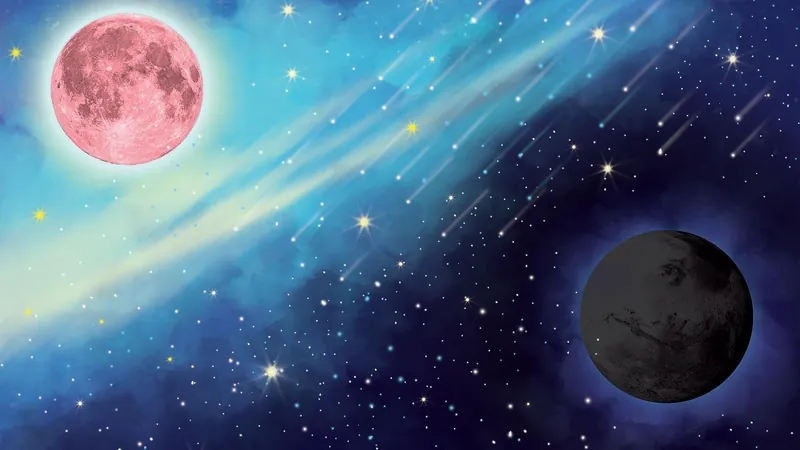
Unlocking Time Travel: Can Dark Energy Be the Key?
2025-04-13
Author: John Tan
A Century of Quantum Mechanics: Exploring New Possibilities
As we commemorate the centenary of quantum mechanics, a groundbreaking field that revolutionized our understanding of the cosmos, the tantalizing concept of time travel has captured the attention of scientists and dreamers alike. Imagine stepping into a sleek machine, pressing a button, and suddenly finding yourself in a different era—a vision that once lived solely in the realm of science fiction is inching closer to reality.
The Dark Energy Enigma
At the heart of this conversation lies dark energy, the mysterious force believed to be accelerating the universe's expansion. Excitingly, in January 2025, a transatlantic team of physicists announced a $5.5 million initiative to simulate dark energy utilizing cutting-edge quantum technology, highlighting an unprecedented intersection of quantum mechanics and cosmology. With 2025 officially labeled as the International Year of Quantum Science, all eyes are on this powerful new frontier that promises to unravel the deepest mysteries of existence.
Einstein's Revelations: Time Is Not What It Seems
The allure of time travel has long fascinated both the general public and theoretical physicists. Albert Einstein's general theory of relativity, introduced in 1915, shattered our notions of time and space, revealing that time is fluid, influenced by gravity and speed. This led to the concept of time dilation—astronauts on the International Space Station age slightly slower than those on Earth due to their high velocity and proximity to Earth's gravitational field. Furthermore, exotic theories like wormholes—hypothetical passages through space-time—pose possibilities for time travel, albeit with the significant hurdles of stability and the need for exotic matter.
Revolutionary Models and Theoretical Breakthroughs
A pivotal moment occurred in 2020 when physicists Germain Tobar and Fabio Costa at the University of Queensland proposed a mathematical model involving closed timelike curves (CTCs). Their research suggested that time travel could be feasible without paradoxes, as the universe might self-correct to maintain coherence. This aligns with the Novikov principle, asserting that time travel cannot allow alterations to past events that would lead to inconsistencies.
Quantum Experiments: A Glimpse into Time Manipulation
Recent quantum experiments further brighten the prospects of time travel. In 2019, IBM scientists demonstrated a simulation of time reversal on a quantum computer, showcasing the potential for manipulating time-like states in quantum systems. While it does not equate to literal time travel, this experiment emphasizes the significant role of quantum computing in modeling temporal phenomena. However, concerns regarding paradoxes, such as the grandfather paradox, remain热门 topics among researchers.
The Quest for a Deeper Understanding of Dark Energy
Dark energy itself presents one of the biggest puzzles in modern physics. Discovered in the late 1990s through observations of distant supernovae, dark energy makes up about 68% of the universe's total energy and appears to be uniformly distributed in space, exerting a repulsive force that accelerates the expansion of the cosmos. Despite its revolutionary implications, its true nature remains elusive, with theories suggesting it may relate to a cosmological constant—a fixed density of energy intrinsic to the vacuum of space.
Groundbreaking Discoveries on the Horizon
The recently launched Euclid space telescope by the European Space Agency represents a significant advancement in our understanding of dark energy. In February 2025, Euclid released its inaugural set of high-resolution cosmological maps encompassing data from over 1.5 billion galaxies, revealing discrepancies with existing models and hinting at new physics. Its mission to precisely measure galaxy shapes and redshifts will allow scientists to rigorously test dark energy theories.
In parallel, the Vera C Rubin Observatory with its ambitious Legacy Survey of Space and Time (LSST) will commence operations in 2025, promising to gather vast amounts of data on celestial objects, further enhancing our grasp of the universe's evolution.
Linking Quantum Theory and Cosmic Expansion
Researchers are now exploring the interplay between quantum phenomena and dark energy. Investigations into quantum vacuum fluctuations could finally associate quantum theory with cosmic scale dynamics. Theories of quintessence and modified gravity are under scrutiny as scientists seek to uncover dark energy's origins. Some propose that understanding dark energy could ultimately reveal whether time travel through cosmic phenomena is truly feasible.
The Ongoing Journey of Quantum Discovery
As 2025 unfolds, the journey through quantum science stands as a testament to humanity's unquenchable thirst for knowledge. Even if we never step into a time machine, exploring the intricacies of quantum mechanics and cosmology will undoubtedly reshape not just our understanding of the universe but of time itself. The quest for answers continues, tapping into the very fabric of reality that binds us.






 Brasil (PT)
Brasil (PT)
 Canada (EN)
Canada (EN)
 Chile (ES)
Chile (ES)
 Česko (CS)
Česko (CS)
 대한민국 (KO)
대한민국 (KO)
 España (ES)
España (ES)
 France (FR)
France (FR)
 Hong Kong (EN)
Hong Kong (EN)
 Italia (IT)
Italia (IT)
 日本 (JA)
日本 (JA)
 Magyarország (HU)
Magyarország (HU)
 Norge (NO)
Norge (NO)
 Polska (PL)
Polska (PL)
 Schweiz (DE)
Schweiz (DE)
 Singapore (EN)
Singapore (EN)
 Sverige (SV)
Sverige (SV)
 Suomi (FI)
Suomi (FI)
 Türkiye (TR)
Türkiye (TR)
 الإمارات العربية المتحدة (AR)
الإمارات العربية المتحدة (AR)